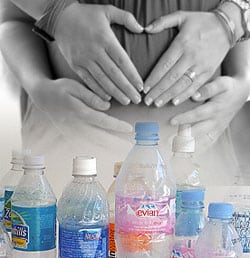
Exposure to the ubiquitous polycarbonate plastics chemical, bisphenol A (BPA) has been linked to failed in vitro fertilization (IVF) procedures. Given its estrogenic mimicking properties, the chemical has long been linked to fertility, genital, and reproductive issues, among other adverse health effects. This recent study, published in Environmental Health Prespectives, found that BPA exposure at […]
 Exposure to the ubiquitous polycarbonate plastics chemical, bisphenol A (BPA) has been linked to failed in vitro fertilization (IVF) procedures. Given its estrogenic mimicking properties, the chemical has long been linked to fertility, genital, and reproductive issues, among other adverse health effects.
Exposure to the ubiquitous polycarbonate plastics chemical, bisphenol A (BPA) has been linked to failed in vitro fertilization (IVF) procedures. Given its estrogenic mimicking properties, the chemical has long been linked to fertility, genital, and reproductive issues, among other adverse health effects.
This recent study, published in Environmental Health Prespectives, found that BPA exposure at levels typically found in the general population, can lessen a woman’s chance of conceiving when undergoing fertility treatment, said Environmental Health News, citing Harvard University research. Women with increased BPA levels were less likely to become pregnant than women with lower levels; the link was stronger with more intense treatments. Pregnancies failed because embryos did not attach to the uterus, said Environmental Health News. Prior animal studies revealed similar results; however, this study was the first time to reveal the link in humans.
The team followed 137 women seeking fertility treatment at Massachusetts General Hospital Fertility Center and reviewed the link between BPA exposure and pregnancy success in women undergoing IVF treatment. The women were of childbearing age—between 18 and 45 years of age—who used their own eggs; most were Caucasian and non-smokers, said Environmental Health News. The women were followed through each IVF cycle until they either delivered their baby or stopped IVF treatment and underwent one of three IVF treatment protocols based on if they were poor or good responders. Poor responders require large doses of fertility drugs and conclude with fewer eggs.
BPA concentrations in urine samples were measured at each treatment and researchers confirmed pregnancies, which were defined as successful embryo implantation, by measuring blood samples for levels of a hormone produced during pregnancy: ß-human chorionic gonadotropin hormone (ß-HCG). ß-HCG is found in blood and urine of women who are as early as 10 days pregnant, said Environmental Health News. The results suggest that increased BPA levels are tied to the number of failed pregnancies in women receiving fertility treatment, which confirms what has been seen in animal studies and supports prior study findings linking BPA to fertility problems.
BPA has been at the center of a fierce debate in the United States between industry, which claims that the chemical is safe, and science, which has linked the estrogenic mimicker to myriad health effects. The U.S. Food & Drug Administration has said that BPA is safe and rejected a petition by the Natural Resources Defense Council (NRDC) on March 30 to ban the chemical. Since, the FDA has called for more BPA studies.
BPA, a compound that uses a combination of phenol and acetone, enters food when it leeches from food and beverage containers, and has been approved by the FDA for use in shatter-resistant polycarbonate plastic and durable epoxy resins. BPA leaches into products—hot or cold—and into the skin, from common items such as paper money, toilet paper, and receipts. BPA works in the body as an anti-androgen, a substance that blocks hormone activity, and mimics estrogen, a powerful female hormone. Because of this, BPA affects, even interrupts, sexual development and processes, especially in developing fetuses, infants, and children.
We recently wrote that another BPA study revealed a possible link to breast cancer and have long written that BPA is linked to toxic injury and life threatening illnesses in many hundreds of studies, BPA has also has been linked to future cardiac issues and was found to mix up the body’s hormones, tricking fat cells into taking in more fat or confusing the pancreas into releasing too much insulin, the hormone responsible to regulate the breakdown of fat and carbohydrates in the body. At least two BPA-breast cancer links and links to increased anxiety and depression in preschoolers exposed to BPA in the womb have been revealed. BPA has also been linked to toxic injury and implications in intestinal problems, brain cell connection interference, increased risks of immune system diseases and disorders, problems with liver function testing, and interruptions in chemotherapy treatment. Increased risks for reproductive system disease, for instance, to uterine health and mammalian reproduction; a deadly uterine infection; premature puberty; Polycystic Ovarian Syndrome (PCOS) and other female fertility and endocrine issues; and erectile dysfunction and male sexual problems in males as young as the developing fetus have been linked to BPA. Very significantly, the National Institutes of Health (NIH) recently said that BPA may affect the development of young and unborn children.


